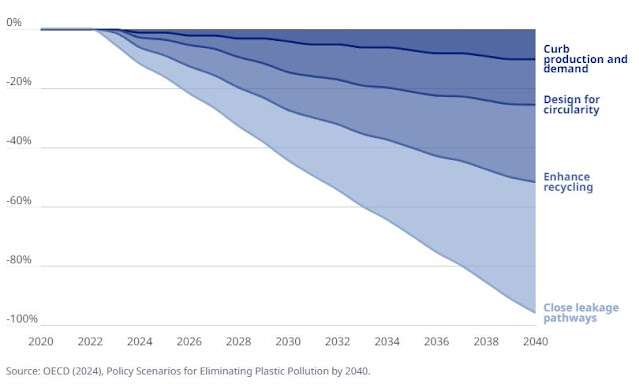A new OECD report highlights the urgent need for global action to eliminate plastic pollution by 2040.
Paris, France – October 2, 2024:
A new OECD report highlights the urgent need for comprehensive global policies to address the escalating plastic pollution crisis. By implementing policies across the entire plastics lifecycle, countries can significantly reduce plastic leakage into the environment and achieve significant environmental and economic benefits.
The report, titled "Policy Scenarios for Eliminating Plastic Pollution by 2040," analyzes the environmental and economic implications of various strategies to combat plastic pollution. It paints a stark picture of the future if no action is taken, with a 70% increase in plastics production and use by 2040, leading to a 50% increase in mismanaged plastic waste and a 40% increase in plastic leakage into the environment.
Improving waste collection, treatment, and recycling infrastructure is essential for reducing plastic leakage. This involves investing in modern waste management facilities and promoting recycling practices.
Implementing measures like plastic and packaging taxes, eco-design criteria, and bans on single-use plastics can help reduce the demand for plastics. This can be achieved through regulations, incentives, and consumer education campaigns.
Encouraging the design of plastics that can be easily recycled or reused can help reduce waste and promote a more sustainable plastics economy. This involves designing products with recyclability in mind and investing in innovative recycling technologies.
The report estimates that by implementing these policies, countries can reduce plastic leakage into the environment by 96% by 2040. This would not only protect the environment but also generate significant economic benefits. While such a comprehensive approach may require some initial investments, it is ultimately more cost-effective than focusing solely on waste management or other partial solutions.
The OECD's findings come ahead of a crucial round of UN talks in November to negotiate a legally binding treaty on plastic pollution. The report provides valuable insights and recommendations for policymakers to develop effective strategies to address this global challenge.
In conclusion, the elimination of plastic pollution requires a global, coordinated effort. By implementing comprehensive policies across the entire plastics lifecycle, countries can significantly reduce plastic leakage, protect the environment, and achieve significant economic benefits. The time for action is now.
